Palliative and Supportive Care Teams offer comprehensive care to improve the lives of patients facing cancer

Image content: This image is available to view online.
View image online (https://assets.clevelandclinic.org/transform/80da3d14-1f47-48dc-84ba-1f6e55b50f83/23-CNR-4203825-PhotoEssay-PHOTO-5-optimized_jpg)
The Featured Image for the post
Thanks to generous donor support, Cleveland Clinic Cancer Institute is able to offer support services to help patients and their care partners throughout their cancer journey. The Taussig Cancer Center is designed for easy access to an array of patient support services intended to reduce the psychological stress of cancer.
Advertisement
Cleveland Clinic is a non-profit academic medical center. Advertising on our site helps support our mission. We do not endorse non-Cleveland Clinic products or services. Policy
There’s a growing body of evidence demonstrating the positive benefits of supportive therapies such as:
These philanthropically-supported services are provided free to patients and their care partners. “Support services are part of our dual mission of treating the disease and caring for each person as a whole, especially as it pertains to their overall quality of life while they’re undergoing cancer treatment,” says Laura Shoemaker, DO, Chair of Palliative and Supportive Care at Cleveland Clinic and Chair of the Ohio Department of Health’s Palliative Care and Quality of Life Interdisciplinary Council.
These services provide comfort to patients and their care partners, offering a respite from cancer-directed therapies. Patients and their care partners can visit the on-site art studio and wellness center to access most services, or patients can request that a therapist bring services to them during their infusion. A few services such as mentoring and reiki are also available virtually.
Patients can visit the Resource Center on the first floor at the main campus in Cleveland to learn more about these services.

Image content: This image is available to view online.
View image online (https://assets.clevelandclinic.org/transform/a4cba092-e992-4147-b992-b19f429cb9a3/23-CNR-4203825-PhotoEssay-PHOTO-1-optimized_jpg)
Musician in residence violinist Ariel Clayton Karas plays in the lobby of the Taussig Cancer Center. Photo by Annie O'Neill.

Image content: This image is available to view online.
View image online (https://assets.clevelandclinic.org/transform/cc0b1bc2-659f-4f96-9d48-44bafe9b097b/23-CNR-4203825-PhotoEssay-PHOTO-2-optimized_jpg)
Listening to, reflecting on, or making music affords patients and caregivers a chance for self-expression, distraction, and comfort. Photo by Annie O'Neill
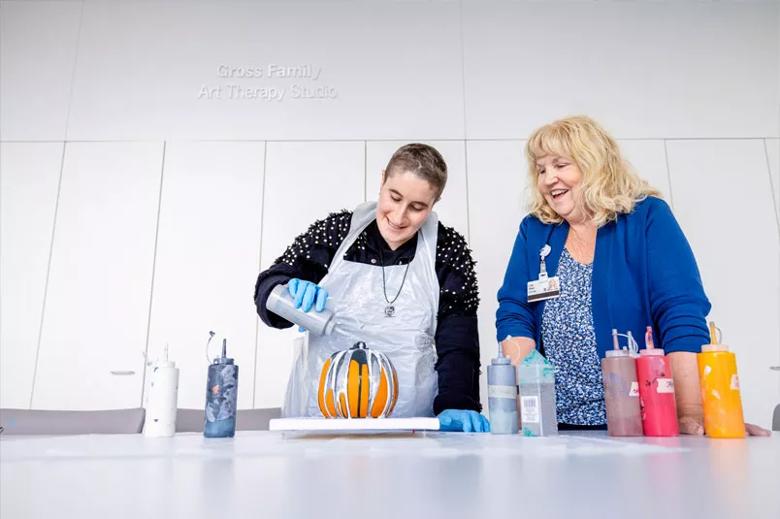
Image content: This image is available to view online.
View image online (https://assets.clevelandclinic.org/transform/b1f2f792-8cd9-4b64-aa02-f6e338771e52/23-CNR-4203825-PhotoEssay-PHOTO-3-optimized_jpg)
Cleveland Clinic Art Therapist Lisa Shea, on right, works with a patient on a seasonal painting project inside the light-filled art studio in the Taussig Cancer Center. Photo by Lisa DeJong
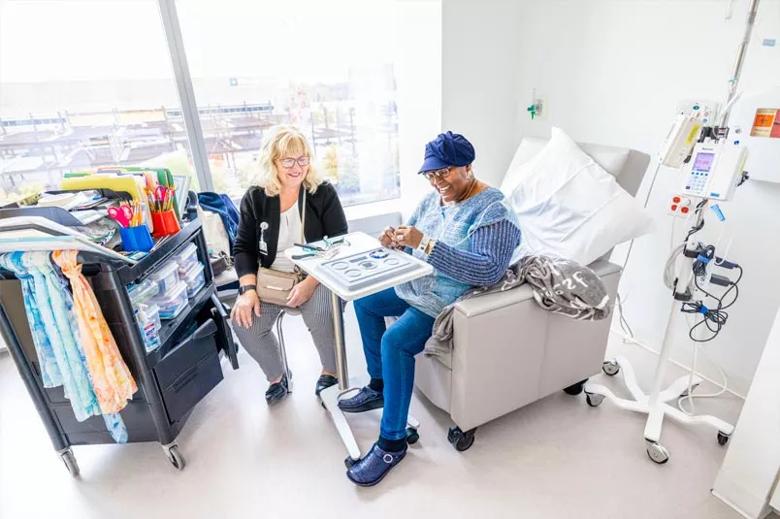
Image content: This image is available to view online.
View image online (https://assets.clevelandclinic.org/transform/cec662f1-599d-4142-9090-7b2733fc2e28/23-CNR-4203825-PhotoEssay-PHOTO-4-optimized_jpg)
A patient makes a bracelet while receiving chemotherapy in her infusion room. If patients can’t come to the art studio, Art Therapist Lisa Shea brings her studio on wheels to them. Photo by Lisa DeJong

Image content: This image is available to view online.
View image online (https://assets.clevelandclinic.org/transform/97299051-6bb9-4ecb-a04f-169d92f320f8/23-CNR-4203825-PhotoEssay-PHOTO-5-optimized_jpg)
Cleveland Clinic Yoga Instructor Kim Mazzone, silhouette in center, leads a free class for cancer patients and survivors through calming stretches and healing meditative practices. Photo by Lisa DeJong

Image content: This image is available to view online.
View image online (https://assets.clevelandclinic.org/transform/e9d9d94b-205a-434b-8c4d-47d32629073d/23-CNR-4203825-PhotoEssay-PHOTO-6-optimized_jpg)
Mazzone applies lavender-scented oil to a patient’s forehead as the free yoga class winds down into meditation. Photo by Lisa DeJong
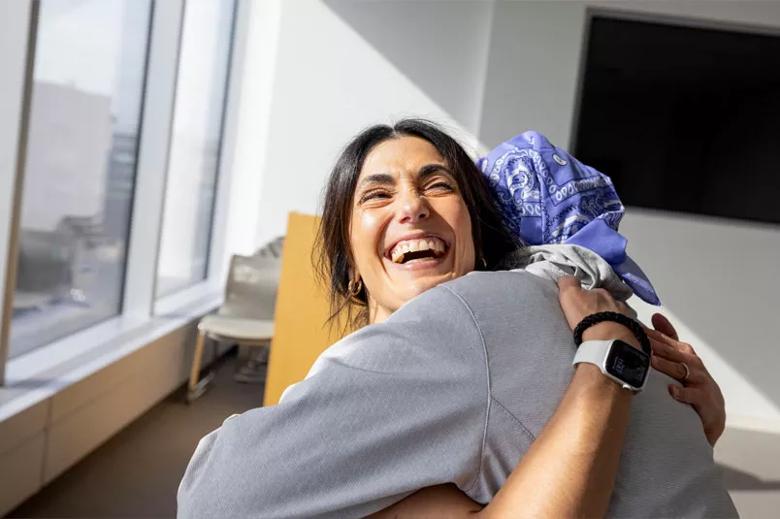
Image content: This image is available to view online.
View image online (https://assets.clevelandclinic.org/transform/c482ad49-9398-423b-811c-b8365e908673/23-CNR-4203825-PhotoEssay-PHOTO-7-optimized_jpg)
Mazzone, left, hugs long-time patient after a free yoga session. Photo by Lisa DeJong

Image content: This image is available to view online.
View image online (https://assets.clevelandclinic.org/transform/1aea94c4-29d2-4b0d-9111-8831a46a219c/23-CNR-4203825-PhotoEssay-PHOTO-8-optimized_jpg)
As sun pours through the windows, a patient brings her yoga session to a close with her namaste position. Photo by Lisa DeJong

Image content: This image is available to view online.
View image online (https://assets.clevelandclinic.org/transform/8755bee0-0b74-4548-9678-6c09dae1d5ff/23-CNR-4203825-PhotoEssay-PHOTO-9-optimized_jpg)
Hands stretch toward the sunlight during a free yoga session at the Taussig Cancer. Photo by Lisa DeJong
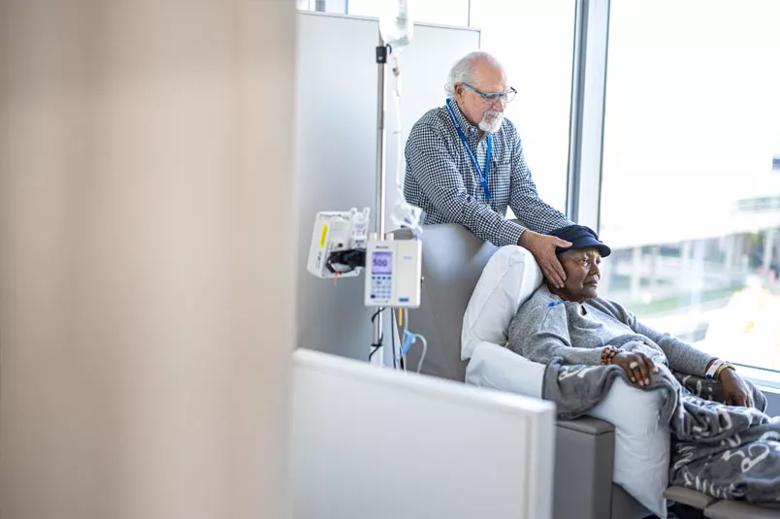
Image content: This image is available to view online.
View image online (https://assets.clevelandclinic.org/transform/6aa1cb8e-3e32-4ce6-9613-76d58c5e1803/23-CNR-4203825-PhotoEssay-PHOTO-12-optimized_jpg)
Certified Reiki Master Therapist Don Iannone, left, offers this gentle touch therapy while a patient remains comfortably seated in their infusion chair. Photo by Annie O'Neill

Image content: This image is available to view online.
View image online (https://assets.clevelandclinic.org/transform/547acc51-472d-4ade-8e47-a3e91c617d78/23-CNR-4203825-PhotoEssay-PHOTO-11-optimized_jpg)
Massage Therapist Paul Tompkins performs massage on a patient to promote wellness and healing. Photo by Annie O'Neill

Image content: This image is available to view online.
View image online (https://assets.clevelandclinic.org/transform/12472925-3b23-4f4b-8dbb-525a4f27ecf7/23-CNR-4203825-PhotoEssay-PHOTO-13-optimized_jpg)
A patient’s eyes sparkle after he receives a free knitted cap made by a volunteer. Photo by Lisa DeJong

Image content: This image is available to view online.
View image online (https://assets.clevelandclinic.org/transform/b27db593-c3c0-4c8c-b567-86e3c890563c/23-CNR-4203825-PhotoEssay-PHOTO-10-optimized_jpg)
Through the 4th Angel Mentoring program, Amy Pappas, left, provides one-on-one support to a fellow patient undergoing a similar cancer journey to hers. 4th Angels like Amy are empathetic cancer survivors with firsthand knowledge who share their time and life experience to help put other patients at ease. Photo by Annie O'Neill

Image content: This image is available to view online.
View image online (https://assets.clevelandclinic.org/transform/4da0ddf0-1ae9-4126-a167-fca5c644b1cc/23-CNR-4203825-PhotoEssay-PHOTO-14-optimized_jpg)
Cleveland Clinic Aesthetic Specialist Heather Ellmers helps a patient with a wig fitting. Photo by Lisa DeJong

Image content: This image is available to view online.
View image online (https://assets.clevelandclinic.org/transform/edf1a1f9-63f7-4c5a-a6fe-c83926826670/23-CNR-4203825-PhotoEssay-PHOTO-15-optimized_jpg)
Cleveland Clinic Executive Chef for Integrative & Lifestyle Medicine Jim Perko makes a smoothie on camera during a live webinar for patients and care partners. As the creator and provider of the first Cleveland Clinic Culinary Medicine patient consult program, he helps patients execute prescribed nutritional plans and find true enjoyment in their new and tailored culinary plan. Perko can set up his portable kitchen just about anywhere, extending his community outreach about culinary medicine to wherever it is needed. Photo by Lisa DeJong

Image content: This image is available to view online.
View image online (https://assets.clevelandclinic.org/transform/67a5d4cf-422d-4dbe-82cd-2d2c54ff931a/23-CNR-4203825-PhotoEssay-PHOTO-16-optimized_jpg)
Cleveland Clinic Registered Dietician Nicole Hopsecger talks about food choices during cancer treatment. Photo by Lisa DeJong
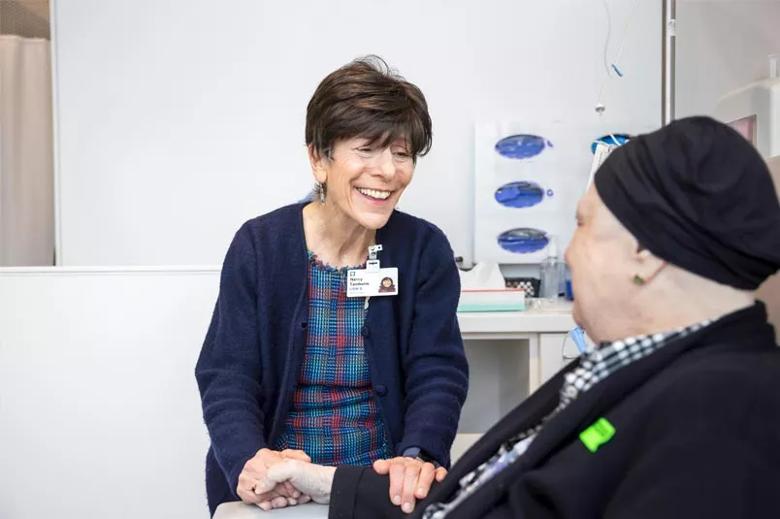
Image content: This image is available to view online.
View image online (https://assets.clevelandclinic.org/transform/f2577a26-b5c3-4f6b-ac2b-e0c0cfbd2110/23-CNR-4203825-PhotoEssay-PHOTO-17-optimized_jpg)
Licensed Oncology Social Worker Nancy Tamburro helps patients and their care partners through counseling, support and advocacy. Social workers also assist with navigating physical and emotional issues during treatment. Photo by Annie O'Neill

Image content: This image is available to view online.
View image online (https://assets.clevelandclinic.org/transform/96c910e7-469b-4e86-8824-0562b5f375aa/23-CNR-4203825-PhotoEssay-PHOTO-18-optimized_jpg)
Financial Navigator Tamara Mason works with a patient to address common issues around insurance and billing. Financial navigators like Tamara collaborate with social workers to begin the work of determining how to lessen the financial burden for patients. The team works with foundations, pharmaceutical companies, community organizations and charities for patient assistance as well as living expenses, such as mortgage, food, childcare and utility payments. Photo by Annie O'Neill
Advertisement
Advertisement
Making a difference by putting empathy into action
Structured interventions enhance sleep, safety and caregiver resiliency in high-acuity units
Automating routine medical coding tasks removes unnecessary barriers
Input from these central stakeholders is leading us to design for healing and hope
Initiative ensures patients leave the hospital with clean, dry clothing
Leadership role offers a way to improve the entire visit
Genetic variants exist irrespective of family history or other contributing factors
An unexpected health scare provides a potent reminder of what patients need most from their caregivers